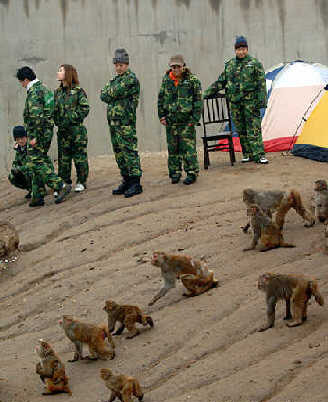| Home / Environment / Public Endeavor | Tools: Save | Print | E-mail | Most Read |
| Monkey Experience Teaches People Lessons in Freedom |
| Adjust font size: |
After five days of living like monkeys, six volunteers emerged from captivity on Monday, each with a better sense of what it means to be human. The six people had been living among the 65 primate inmates of the monkey enclosure at the Qinling Wildlife Park in Xi'an, capital of northwest China's Shaanxi Province, since February 7.
Ren Feixiang, the park's director, designed the experiment to teach people what it was like to lose their freedom like the animals at zoos. Everyone who took part in the activity agreed to live as the monkeys lived for five days and five nights. Zookeepers gave them a little food, though most of it came from the park's visitors. "We chose the six people from a pool of more than 2,000 applicants from all over the country and put in place numerous safety measures to protect the participants," Ren Feixiang said. The six participants were Chen Xianhu, 37, a policeman from Xi'an; Wang Wei, 23, a salesman from north China's Shanxi Province; Liu Jialei, 22, a student at Shaanxi Normal University in Xi'an; Zhang Yuqin, 50, a rural doctor from Xi'an Yuhuazhai Village; Li Huan, 21, a clerk at an insurance company in Xi'an; and Zhang Hao, 22, a student at a police school in central China's Hubei Province. "During the past five days and nights we suffered from hunger, cold, insomnia, attacks from monkeys and even disputes among the participants, but we overcame these difficulties and found unity and friendship," said Zhang Yuqin. On the third day of the experiment, Wang Wei said he wanted to give up because of hunger and the harsh living conditions, but the other participants eventually persuaded him to stay. During their time in the monkey enclosure, the six people ate only corn bread, carrots, bananas, apples and eggs. And they slept in two small tents, which did little to keep out the cold. Still, none of the participants fell sick, said Zhao Liang, the doctor who was in charge of the participants' health. "The hunger and cold were really serious tests for us because we all come from single-child families and had never had such experiences," said Li Huan and Zhang Hao, who are a couple. "We think the campaign was a challenge. It made us stronger and more able to cope with future difficulties." Li Yanling, a zookeeper, praised the participants' bravery and noted that the experiment aroused the public's curiosity in wildlife. "Visitors paid more attention to the monkeys' health and did not casually throw things like cigarette butts, bottles and garbage into the enclosure during the experiment," the zookeeper said. The stunt marked the first time that people had been allowed to live among the animals at the zoo to experience life through their eyes. Some commentators initially suggested that the monkeys would be scared and that the experiment would not turn out as well as the organizers expected. And some people complained that it was little more than a publicity stunt. Zhen Yuelin, a researcher at the Xi'an Social Development Research Institute, said taking care of animals is an important task and that people should do more to show they care about the welfare of animals. (China Daily February 13, 2007) |
| Tools: Save | Print | E-mail | Most Read |
 |
| Related Stories |
|
|||
